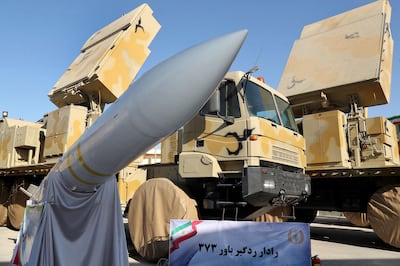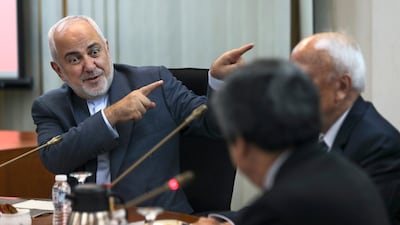The United States imposed new sanctions on Iran on Wednesday, hitting two networks that it says helped boost Tehran’s nuclear programme and evade financial measures to benefit the government and military.
One of the networks used a Hong Kong-based front company to avoid sanctions and target US technology and components on behalf of people tied to Iran's government and its Islamic Revolutionary Guard Corps, the US Treasury Department said in a statement.
The other network obtained aluminium alloy products controlled by the Nuclear Suppliers Group, a body that oversees the export of goods that can be used for nuclear weapons manufacturing, on behalf of companies owned or controlled by Iran's defence ministry, the department said.
The US Treasury Department also slapped sanctions on individuals connected to the two networks.
The move is part of a US campaign to raise economic pressure on Tehran over its nuclear program.

Washington ditched a 2015 nuclear deal with Iran and five other countries, and has ratcheted up sanctions on Tehran, including imposing penalties on Iran's Foreign Minister Mohammad Javad Zarif.
The minister says he is unaffected by the sanctions.
On Monday, US President Donald Trump said at a news conference that he would be open to meeting with Iran's President Hassan Rouhani. On Thursday, Mr Zarif said that Iran would only be interesting in meeting for talks with Washington if it ceased it’s “economic terrorism” against them and observed the 2015 nuclear deal.
"The United States is engaged in an economic war against the Iranian people and it won't be possible for us to engage with the United States unless they stop imposing a war and engaging in economic terrorism against the Iranian people," Mr Zarif told reporters in Kuala Lumpur.
"So if they want to come back into the room there is a ticket that they need to purchase and that ticket is to observe the agreement," he said, referring to the 2015 nuclear deal.
Mr Rouhani on Wednesday called on the Iranian people to overcome the “economic war” but added that his government would try to use diplomacy to try and solve the standoff despite its distrust of Mr Trump.
Mr Rouhani also said on Tuesday there would be no talks with the United States until all sanctions on Tehran were lifted.
Iran, which has slowly been breaching the nuclear deal in retaliation for US sanctions, has threatened further violations in early September unless it receives sanctions relief.
Iranian government spokesman Ali Rabie said on Wednesday: "Taking into account Donald Trump’s personal traits, we don’t trust him; however, Iran has never abandoned diplomacy but we are determined to pursue it as an equal [of the United States]," state TV reported.

In Washington, U.S. Defense Secretary Mark Esper said a U.S.-led maritime security initiative in the Gulf had started.
So far, Britain, along with Australia and Bahrain, have joined the United States in a move to protect merchant vessels following Iran's seizure of a British oil tanker in the Strait of Hormuz in July.
Mr Esper said that the presence of the United States and its allies in the region had so far deterred Iran from further action.
"I'm not sure I'm ready to call the crisis over yet, but so far so good and we hope the trend lines continue," Mr Esper told reporters at the Pentagon.

